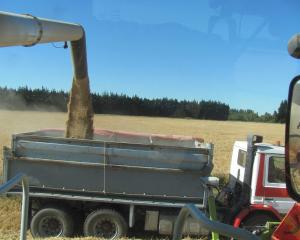
Mr Wallis manages Minaret Station at Lake Wānaka, owned by his family since 1995.
A luxury alpine lodge set up about 15 years ago is the base of a high-country tourism business for visitors to go heli-skiing and touring, hiking, backcountry fly fishing and guided hunting.
There were challenges to overcome before high-country tourism and other ventures could go to the next level, he told about 230 farmers and industry people at a high-country field day run by Federated Farmers at North Canterbury’s Glens of Tekoa, The Grampians and Lochiel stations.
"We are seeing a big change and it’s being driven by diversification and driven by a desire for an increased income. I liken it a bit to us seeing an increase in the number of people making jerseys from their wool, making blankets and selling things off the farm. The challenge for those businesses is equally the same as new tourism businesses — how do you get a critical mass? Once you sell jerseys to the people who know you and who hear you, how do you get that critical mass to go further than that and it’s a real challenge."
Mr Wallis said sheep and beef farmers needed to be careful they did not go from one low margin business to another.
"I’m not trying to put you off because there’s a real opportunity to do more, and some of it is to do it yourself and another options is to allow a third party to do it and you guys become an experience along the way."

Minaret is accessible only by boat or by helicopter.
Part of The Alpine Group, the family connection with the property dates back to the early 1960s when his late father, Sir Tim, recovered deer by helicopter in the area and took tourists on backcountry flights.
The family still has a letter written by him to his mother when he first moved to Wānaka saying he had found a property which he thought would suit a tourism venture in trophy hunting.
They have assumed this property was Minaret, although it was never identified in the letter.
Mr Wallis said when his four brothers took over as directors of the family company, they began looking closely at the property.
"One of the challenges we were going to have down the track was the value of the property on the balance sheet, as it was only going to get greater and greater. Even a 30,000 stock unit property will be challenged ... and our property [has] a covenant so very difficult to take things out of the company so we assume the property sits on a legacy horizon and will be there for generations to come. It’s a relatively small part of a much wider business. Our interest in tourism grew into a tourism business and a desire to diversify and increase the income that came from the property."

"We went in with a very clear goal that we don’t want to do twice as many people for half as much which is often a Kiwi mentality. We wanted to keep the numbers low and the returns high if possible."
Today, the station runs several thousand head of beef cattle and 10,000 to 14,000 red deer.
Mr Wallis said tourist activities run on Minaret were a small part of the tourism business extending from the high country of Fiordland to Canterbury.
"The alpine lodge is open 12 months of the year and we have all sorts of activities, but we are not a dude ranch. The activities include heli-skiing, e-biking, horse-riding and hiking and you can catch a fish in the rivers or the lake. While we didn’t want to get into a numbers game, we also didn’t want to get into doing something we wouldn’t naturally be doing. The horses are on the station anyway so the horse riding was an extension of what we were already doing and that’s grown to be a good business."
Large properties with shearers’ quarters and long drops out the back hut were part of infrastructure and farmers were looking at generating an income from them, he said.
"I would say the biggest asset you have in tourism is not necessarily the land and that vista because you have got to provide that experience on a foggy day. That’s tourism and tourism is about people."

Mr Wallis said nobody paying for an experience should be exposed to an undue risk.
However, farmers running tourism businesses needed to be aware there had been few successful defences of the Health and Safety at Work Act, he said.
"It is something that everybody needs to take into account when they have tourism businesses is that phrase PCBU — person conducting a business or undertaking — and it’s not necessarily clear as to who that is, but if you are the landowner I would argue you are probably still a PCBU at the moment until things change."
He appealed to politicians attending the field day to look more closely into cross-party agreements for critical high country policies transferring from one government to the next at each election.
Listening to a speaker lineup at the first stop at Glens of Tekoa station were senior politicians, including Chris Hipkins, Andrew Hoggard, Jo Luxton, Steve Abel and Stuart Smith.














